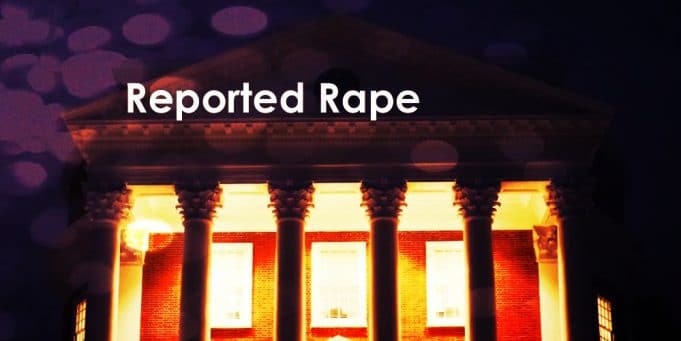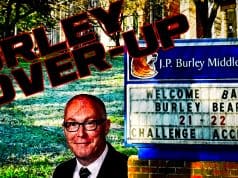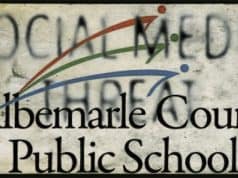Thanks to University of Virginia Police Chief Tim Longo for notifying the “University Community” of an alleged rape.
Since the University Community includes greater Charlottesville, here is the dispatch in its entirety, for the rest of us:
From: “Timothy J. Longo, Associate Vice President for Safety and Security and Chief of Police”
Date: Thursday, June 18, 2020 at 12:44 AM
“This warning addresses a report of sexual assault. Resources are available on and off Grounds to provide assistance. Visit http://www.virginia.edu/sexualviolence/ for support.”
Timely Warning
“Your Right to Know”
June 18, 2020
Date and Time of Incident: 6/17/2020 at 6:25 PM
Report Type: Rape
Incident Number: CPD 2020-16644
Reported Offense: A sexual assault was reported to University Police on June 17, 2020 at 11:52 PM. The reported assault occurred on June 17, 2020 at 10:25 PM, at 140 Emmet Street .
The survivor indicated that was sexually assaulted by an unknown male at approximately 10:25 p.m. on June 17, 2020. The incident is currently being investigated by the Charlottesville Police Department.
Appearance of suspect is reported to be:
|
Age: |
Unknown |
|
Eye Color: |
Unknown |
|
Hair Color: |
Unknown |
|
Height: |
Unknown |
|
Race: |
Unknown |
|
Sex: |
Unknown |
|
Weight: |
Unknown |
|
Additional Description: |
Heavy set male with a light brown beard. |
The University of Virginia shares this information to protect members of the University community, to promote safety, to help reduce the likelihood of future crimes, and to raise awareness of how to seek prompt assistance should a crime occur.
- No action or inaction by a crime victim makes that person responsible for another person’s abusive or criminal conduct. The following suggestions may help reduce the possibility of experiencing a crime, or may improve opportunities to receive prompt assistance.
- The most common type of sexual assault occurs between individuals known to one another, including an acquaintance or in the context of a current or prior dating or domestic relationship.
- Alcohol and drugs are often used to create vulnerability to sexual assault. Studies of sexual assault incidents show a high correlation between non-stranger sexual assault and drug/alcohol usage. Be alert to people pressuring you or others to use alcohol or other drugs.
- Trust your instincts. If you feel uneasy or sense something is wrong, do what you can to get out of that situation or call for assistance.
- Use and encourage others to have a companion or a safe means of getting home, i.e., a trusted friend, taxi, or Safe Ride if available.
- Safely intervene and/or call for help if you witness disrespectful or inappropriate behavior, or a violent crime. Plan in advance: discuss how you might do this in conversations with your friends, using different scenarios, when you aren’t facing a potential crisis. Remember the three D’s of Green Dot: Distract, Delegate, Direct.
- Invite a Hoos Got Your Back facilitator to your residence hall, suite, or organization to present on bystander intervention, or increase your understanding of these issues by inviting a peer educator from Culture of Respect Educators (CORE) to present to your organization.
- If someone is behaving disrespectfully or making you feel uncomfortable, take steps to remove yourself from the situation early, especially if you are concerned it may become physical.
- If you feel as though someone may be stalking you, ask someone who understands these issues like UPD, Office of the Dean of Students, the Women’s Center, or CAPS to help you clarify what’s going on and to develop a safety plan.
- If you feel afraid, call 911 or utilize transportation resources, such as the Yellow Cab Charge-a-Ride program (434) 295-4131, and P&T Safe Ride (434) 242-1122. Put their numbers into your speed dial. Know Safe Ride’s service area and hours by visitinghttp://www.parking.virginia.edu/saferide.
- If you feel threatened on Grounds or in nearby areas, look for a blue light emergency phone or call 911.
- You have the right to defend your body, your personal integrity, yourself.
- Do not second-guess yourself or the intentions of the person harming you. If you have indicated that you do not want to engage in a particular sexual activity and your partner ignores you, take this as a sign that he or she has no intention of taking your feelings into consideration. This will help you decide what to do next.
- There is no shame in being a victim. Talk to someone who has knowledge of community and university resources. There are many people on Grounds and in the community who can help you identify resources and options and who may be able to reduce the impact on your well-being and help you end the abuse.
- Your voice and your body are your best weapons. Learn effective ways to use them by taking a self-defense class, and bring a friend with you.
The following is a list of forms of sexual assault. They are also a violation of the University of Virginia’s Policy on Sexual and Gender-Based Harassment and other Forms of Interpersonal Violence:
- Having intercourse with another person without their consent.
- Having intercourse with another person by force or threat of force.
- Having intercourse with another person who is incapacitated and as a result, unable to give consent. Incapacitation can be caused by voluntary intoxication by the victim or by the perpetrator intentionally inducing ingestion of alcohol or drugs to cause incapacitation.
- Having intercourse with another person after spiking that person’s drink with date-rape or predatory drugs in order to induce incapacitation so that the person cannot resist or recall the incident.
- Having intercourse with a person who is asleep, unconscious or otherwise unaware the intercourse is occurring.
- Using threats, intimidation or coercion (unreasonable pressure) to compel someone to have intercourse against their will.
Sexual Intercourse is:
- Any penetration
- However slight
- With any object or body part
- Performed by a person upon another person
ADDITIONAL INFORMATION ABOUT CONSENT
- Affirmative consent must be present for all forms of sexual activity. Affirmative Consent is informed (knowing), voluntary (freely given), and active (not passive), meaning that, through the demonstration of clear words or actions, a person has indicated permission to engage in mutually agreed-upon sexual activity.
- Affirmative Consent cannot be obtained by Force. Force includes the use of physical violence, threats, intimidation, and/or coercion.
- Affirmative Consent cannot be gained by taking advantage of the incapacitation of another, where the person initiating sexual activity knew or reasonably should have known that the other was incapacitated. Incapacitation means that a person lacks the ability to make informed, rational judgments about whether or not to engage in sexual activity.
RESOURCES:
The administration, faculty and staff of the University of Virginia are here for you. If you have experienced any crime including interpersonal violence (IPV), stalking, and/or sexual violence, we encourage you to share this information with us so that we can provide you with support, resources, options, medical attention and academic accommodations. You can read about these resources, the University’s policies, and learn how this violence might impact you or your friends on our Sexual Violence Education and Resources website: http://www.virginia.edu/sexualviolence/.
University (Non-Confidential) Resources: For information regarding resources and reporting options, you are encouraged to contact the University’s Title IX Coordinator at titleixcoordinator@virginia.edu or at (434) 297-7988, the Office for Equal Opportunity and Civil Rights at uvaeocr@virginia.edu or (434) 924-3200, the Office of the Dean of Students by phone at (434) 924-7133, or the University Police Department at (434) 924-7166. A Student Resource Guide and other information is also available on the following websites: www.virginia.edu/sexualviolence or www.virginia.edu/uvapolice.
Reporting Options:
Victims of sexual assault, intimate partner violence, or stalking have several reporting options:
- Report directly to law enforcement by calling 911.
- File a report through Just Report It, the University’s website for online reporting, which allows for anonymous reporting.
- Contact the University’s Title IX Coordinator at (434) 297-7988 or the Office of the Dean of Students at (434) 924-7133 to file a report. You can access the Dean on Call by calling UVA Police and ask for the Dean on Call) – (434) 924-7166
- Request to file a police report at the hospital if medical attention is sought through the UVA Emergency Department.
Confidential Resources: Victims of sexual assault, intimate partner violence or stalking are encouraged to talk to someone to understand their resources and options. There are many confidential resources on Grounds and in the community:
University Confidential Resources
- Counseling & Psychological Services (CAPS) (434) 243-5150 or (434) 972-7004 (after hours)
- Student Health: Gynecology (434) 924-2773
- Student Health: General Medicine (434) 982-3915 or (434) 972-7004 (after hours)
- Student Health: Psychologists in the Student (434) 243-5180 or SDAC@Virginia.edu
- Student Health: Student Disability Access Center (SDAC) (434) 243-5180 or SDAC@Virginia.edu
- The Women’s Center: Counseling Staff (434) 982-2252 or (434) 982-2361
- The McCue Center: Sports Medicine and Sports Psychology Clinical Staff (Serves student-athletes) (434) 982-5450
- UVA Teen and Young Adult Health Center (Provides health care for ages 12 to 26) (434) 982-0090
- Mary D. Ainsworth Psychological Clinic (Clinical training program that generally does not see patients in crisis) (434) 982-4737 or ainsworth@virginia.edu
- Sheila C. Johnson Center for Human Services (434) 924-7034
Other University Resources: Other sources of support include the Office of the Dean of Students and the University Police Department. For more information, contact the Office of the Dean of Students by phone at 924-7133, consult the Student Resource Guide, or visit these websites: www.virginia.edu/sexualviolence or www.virginia.edu/uvapolice.
Community Confidential Resources
- Sexual Assault Resource Agency (SARA) Office: (434) 295-7273 or 24-hour Hotline: (434) 977-7273
- Shelter for Help in Emergency (SHE) Office: (434) 293-6155 or Hotline: (434) 293-8509
- Family Violence and Sexual Assault Virginia Hotline of Virginia: Call: 800-838-8238 or Text: 804-793-9999
- Sexual Assault Advocacy Fund (Confidential legal information and representation): (434) 327-1447 www.studentsaaf.org
It is on all of us to put an end to sexual violence. Become an informed and effective bystander in the prevention of sexual assault. If you see something, intervene, contact someone who may assist, or call 911. Get involved! Find out how by visiting http://notonourgrounds.virginia.edu/hoosgotyourback.
Please take all necessary steps to protect yourself and each other – and know that you should never hesitate to call 911.
Emergency/Crisis Resources (24/7):
|
Police |
911 |
|
Sexual Assault Resource Agency |
(434) 977-7273 |
|
Shelter for Help in Emergency |
(434) 293-8509 |
|
Counseling and Psychological Services (CAPS) Emergency Line: |
(434) 243-5150 |
|
Dean on Call (Call UVA Police and ask for the Dean on Call): |
(434) 924-7166 |
|
UVA Emergency Department/Sexual Assault Nurse Examiners: |
(434) 924-2231 |
|
Family Violence and Sexual Assault Hotline of Virginia: |
(800) 838-8238 |
Ongoing Support from Confidential Resources:
|
Department of Student Health |
(434) 924-5362 |
|
|
CAPS |
(434) 243-5150 |
|
|
General Medicine |
(434) 972-3915 |
|
|
Gynecology |
(434) 924-2773 |
|
|
Maxine Platzer Lynn Women’s Center Counseling Services |
(434) 982-2252 |
Ongoing Support (Non-Confidential) and Guidance, including academic and housing accommodations:
|
Office of the Dean of Students |
(434) 924-7133 |
|








